SPFBO 7 – Meet The Judges
SPFBO is back once again!
Submissions have opened and have already been filled – and the Hive have been allocated their 30 books. That’s right, there’s no hanging about this year!
I hear the faint grumbling from some of you – what’s a SPFBO?
The Self-Published Fantasy Blog Off is a contest hosted by author Mark Lawrence, in which ten blogs whittle 300 self-published fantasy books down to one winner.
Here are some important links for you:
Rules and Submission Info
SPFBO Facebook Group
Now that we have our 30, we’ll be back soon with an introductory post and an insight into our process.
For now though, as we wait for those entries to come in, let me introduce you to our SPFBO 7 judges:
 |
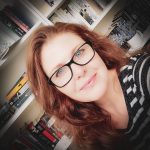 |
 |
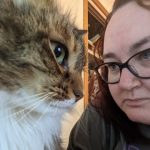 |
 |
| Theo | Scarlett | Peter | Belle | Calvin |
1. Terry Pratchett said “Humans need fantasy to be human. To be the place where the falling angel meets the rising ape.” What’s your favourite kind of fantasy? Is there a particular subgenre you prefer?
Calvin: I like pretty much any and all fantasy. I’m not a fan of grimdark, but otherwise I have eclectic tastes. My first love has always been epic fantasy–lush world building, politics, quests, kingdoms hanging in the balance. But I’ve also recently found myself drawn to progression fantasy. That’s probably because of the magic. The more the better, I say! I enjoy a good romantic subplot as well. As I said, I’m fairly eclectic, but my first love in fantasy is definitely magic.
Belle: I try not to get bogged down in subgenres, but generally I’m drawn to anything where people are out to change the world, make something better out of it. I like big sprawling worlds that I can get lost in, while really getting to know the characters. Like Calvin, I’m not a massive fan of grimdark and I enjoy a good romance.
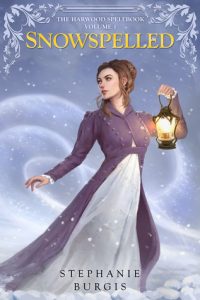 Peter: I will very happily read most fantasy, my favourite has to be epic fantasy – politics, world-building, threats to a kingdom/world. I have found myself recently moving toward urban fantasy, there are some wonderful books I could name. Being able to explore a city (which was a hobby of mine pre pandemic) through fantasy is wonderful.
Peter: I will very happily read most fantasy, my favourite has to be epic fantasy – politics, world-building, threats to a kingdom/world. I have found myself recently moving toward urban fantasy, there are some wonderful books I could name. Being able to explore a city (which was a hobby of mine pre pandemic) through fantasy is wonderful.
Scarlett: Fables and Fairytales were a big part of my childhood and I still enjoy finding those roots in the fantasy genre. Historical- and High fantasy are among my favorites. I’m a sucker for timelines, alternate endings, a bit of steampunk and adventure. Coming of Age, swashbuckling tales, magic, artifacts, myth and a bit of dark and gritty are high on my list too. I always love a great underdog and am keen on wise ol’ wizard type characters! If there are dragons or animal companions, count me in!
Theo: I don’t find myself thinking in terms of sub-genre so much these days. I have found books that I like in a range of subgenres. It’s more about what the author does in and with the sub-genre. I like reading something different, I like fresh takes on old tropes, I like books that embrace and respect diversity and also offer compelling characters. None of that is particularly genre specific. However, I must admit I am always drawn to well written leading* woman characters, kick-ass warriors like Eowyn and Arya are good, but also I like seeing more subtle skills of politicking and magic like Cassandra in Stephanie Burgis’s Snowspelled.
* I say leading because “strong” is something of a pejorative adjective which wouldn’t be applied to male characters, something my eldest daughter once pointed out to me while also telling me about the Bechdel test (Bechdel test – Wikipedia)
2. What first drew you to being involved in the SPFBO contests? And (if returning to the competition) what pulls you back into it?
Calvin: I discovered SPFBO some years ago when I first started reading self-published fantasy. That first year (which was maybe year three of the contest?) I didn’t follow things closely, but knew the finalists and winners. Since then I’ve followed the entire competition very closely. I haven’t been an official judge before–so I’m especially looking forward to this year!–but I’ve reviewed many of the entrants and I’ve enjoyed the community that springs up around SPFBO. Ultimately, what keeps me coming back is the plethora of great books I find. Every single year I discover books that I absolutely adore among the entrants.
Belle: I discovered SPFBO a few years ago, and had a great time reading a few of the SPFBO 4 finalists. I’ve judged a bit during 5 and 6. I love getting the initial batch of books – it’s so fun to go hunting for a new fave author, and I’ve come across a few in the past couple of years!
Peter: I credit the SPFBO with my general discovery of self published fantasy, since then I have followed it closely and discovered some great books and authors. It was my first time as a judge in SPFBO 6 and it was a blast, I honestly think it is the chance to discover something special that has pulled me back. I found a great series in SPFBO 6 that was a semi finalist and I am excited about this prospect in SPFBO 7. I also have a chance of working with some awesome people again as well.
Scarlett: SPFBO 7 will be my first go at the contest as a judge. I have watched the events of the last 3 years unfold from the sideline and eagerly followed everything on social media. When I first started reviewing a few years back, most of my review requests came in from self-published authors and I quickly discovered some amazing gems and keepers.
I love that SPFBO, with the help of the bookish community, has a way to shine some light on self published authors and I’m thrilled at the opportunity to take part in it in SPFBO 7.
Theo: Having pursued the self-published route with my own trilogy, I felt strongly that self-publishing was a choice and one that did not deserve the disdain with which it has been viewed in the past – I do think that attitude is shifting, partly due to competitions like SPFBO. I also felt the sense of invisibility that self-published authors can feel in a very crowded marketplace. So, as participant and judge I have been inspired by SPFBO’s mission to shine a light on and give a chance to the very best of self-published work. But what keeps me coming back is the sense of SPFBO’s own community. The teams of judges, the wilder collective of bloggers all have a forum and an opportunity to talk about great self-published fantasy, the authors and those who observe from the sidelines. What I have particularly enjoyed is how each year’s finalists have also banded together in a mutually supportive group making friendships rather than fearing rivalries. It’s like The Great British Bake Off, but for books.
3. Out of the elements of plot, characters, prose and worldbuilding, which is most important to keep you reading on in a fantasy book?
Calvin: Characters. Don’t get me wrong, as I already mentioned, I love world building and amazing magic systems, plot is important, and I love beautiful prose as much as the next person. But at the end of the day, the characters are what keep me coming back. I’m more forgiving of a plot that might have some oft-used tropes than I am of poorly drawn characters. I want to find a character I want to see develop, or who I can cheer for as they embark on their quest, or two characters who just need to fall in love, that sort of thing. Oh, and banter! I love some great banter between characters. Plot, prose, and world building are important too, but characters are the most important for me.
Belle: For me, it’s probably prose, with plot and characters close behind. I have to be interested in the story and I need to care about the characters (not necessarily like them, but at least be interested in whatever mischief they’re getting up to), but if I can’t sink into the prose, I’m considerably less likely to finish a book.
Peter: Characters for me as well. I love writing styles, world building and magic systems, plot can be important as well. I have had several DNF when I have just not been able to engage with characters, particularly secondary characters, and it can ruin books for me. I love seeing characters develop, and one’s that I can get behind. Also if a well handled secondary character arrives, has some good conversations/banter with the main character and then they fall in love – then I am cool with that as well.
Scarlett: I have a feeling that my thoughts will differ a bit from most on this one because I just adore good prose, wordplay and worldbuilding. Characters are important and I like them well fleshed out, but a nice combination of all three of those will definitely keep me engaged. The perfect novel for me would be one in which I’m hooked to a character through some gripping detail or trait right from the start and the worldbuilding takes its time and unfolds naturally. Settings and mood can make a big difference to me as a story progresses, especially if I read historical, high or portal fantasies that are supposed to transport me to the author’s imagined world/time. However, there is one thing that will kill my interest in a plot even if the setting is great, and that is if characters or groups of characters, are too agreeable throughout the plot without any conflict. That’s just like cold coffee to me and I can’t do it.
Theo: While worldbuilding is important – the most fundamental aspect of fantasy writing – I think it’s also the most accessible. I am always amazed in SPFBO at the creativity and innovation of the authors who find new worlds and new conflicts and new ways of being to write about. But time and time again I’ve seen the initial promise of an intriguing premise get lost in poor execution. If there were a Mazlow’s hierarchy of necessities in fantasy fiction, worldbuilding is the essential base, plot is the framework or skeleton that gives the story its structure, compelling characters put flesh on the bones, but for me the pinnacle of that hierarchy, the element that breathes life into the whole is the prose. I want books where my kindle is littered with highlights and “nice line” annotations.
4. Would you defeat a Dark Lord, or be one?
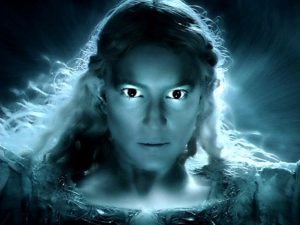
Calvin, probably.
Calvin: I really want to say I’d defeat a dark lord. But…if I’m honest…I’d totally be Galadriel. Instead of a Lord, you would have a QUEEN BEAUTIFUL AND TERRIBLE AS THE…*ahem* well, you get the point. I’d mean well, but after I had power I’d try to right every injustice by executing the perpetrators, and somewhere along the line I’d look around only to realize I had become the thing I hated.
Belle: You know, I really think I’d rather be the power behind the throne, just getting out there and making things happen while my master/mistress swans around being all evil. Long-suffering, mildly exasperated henchman, that’s me.
Peter: I would draw my sword and defeat the Dark Lord every time. Why? Having a cause you believe in is amazing and yes we need to fight against the injustices caused by a Dark Lord. Then we can find someone like Elend Venture to take over…I can be his right hand man.
Scarlett: Uhg….I’m having an inner conflict on this one. The devil on my shoulder says: ”Take the path that rocks”, vs. the angelic counterpart who whispers sweet kittens and endless ice cream for everyone into my ear. Oh, I love a good Dark Lord…truly…but ultimately, I don’t think I have what it takes to be one. Now hand me my ice cream.
Theo: Well, given that nobody in history ever thought “Hey, we’re the bad guys” I reckon Dark Lordism is simply a matter of perspective. So I would opt to be an omnipotent and benign “Supreme Leader” so that I could. of course, right all the World’s wrongs (as I see them) in the certain knowledge that there would still be plenty of people who would view me as the Dark Lord.
5. Tell us about some of your favourite characters in self-published works of fantasy?
Calvin: Oh. Wow. What a question. Let’s start with Eithan, from Will Wight’s Cradle series. I mean…so much banter and wit, he’s hilarious. Then there is Auric from Mike Shel’s Iconoclasts series. He represents one of the best portrayals of post-traumatic stress I’ve ever seen in a fantasy novel. Both Mamoru and Misaki from M.L. Wang’s The Sword of Kaigen are so amazingly well-written and believable, with emotional arcs, I just can’t say enough about how much I love them. Suri, from Michael J. Sullivan’s Legends of the First Empire series, is another favorite character. Her arc is really interesting. Gabe, from Josh Erikson’s Ethereal Earth series, is another that I love for his banter.
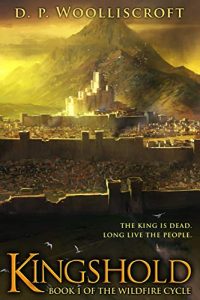 Belle: I really like Perle from Our Bloody Pearl by DN Bryn – they’re so clearly not human, but extremely relatable as they try to navigate this new world they find themself in. I am clinging to the technicality of this one, but I love Rah from We Ride the Storm by Devin Madison at least as much as I want to kill him. [Ed: we’ll allow it] He is SUCH an idiot but he’s an idiot that’s trying to do the right thing, always, no matter the personal cost. I can respect that, even if I’d like to shake some sense into him. I’m not sure if you can really count this one as a character, but technicalities. Stariel from The Lord of Stariel by AJ Lancaster has so much personality that it practically jumps off the page, despite not being a POV character, or even human. I love how it gets its point across with the limited communication options available, and how it manages to be so completely sassy.
Belle: I really like Perle from Our Bloody Pearl by DN Bryn – they’re so clearly not human, but extremely relatable as they try to navigate this new world they find themself in. I am clinging to the technicality of this one, but I love Rah from We Ride the Storm by Devin Madison at least as much as I want to kill him. [Ed: we’ll allow it] He is SUCH an idiot but he’s an idiot that’s trying to do the right thing, always, no matter the personal cost. I can respect that, even if I’d like to shake some sense into him. I’m not sure if you can really count this one as a character, but technicalities. Stariel from The Lord of Stariel by AJ Lancaster has so much personality that it practically jumps off the page, despite not being a POV character, or even human. I love how it gets its point across with the limited communication options available, and how it manages to be so completely sassy.
Peter: Blimey this is a great question! Right Marith from D.P Wooliscroft’s Wildfire Cycle is amazing, he has had one brilliant arc so far and he’s a Bard as well – enough said. Tashue from Legacy of the Brightwash by Krysta Matar is a great character, Caleb Rusk from Deck Matthews’ Riven Realm Saga and Amra Thetys from The Thief who pulled on Trouble’s Braids by Michael McClung.
Scarlett: I love the character Thomas Senlin, from The Books of Babel by Josiah Bancroft. His transformation over time from meek and quiet to brave and adventurous was so much fun to read. I also really liked Fetching from The Lot Lands series by Jonathan French. Such a tenacious character from the beginning while making her place in the hoof among the other riders till she became the leader of her own lot. Another character I enjoyed was Task, the last Wind-Cut golem in Ben Galley’s Stone Heart. He was by far my favorite character in that novel, next to the girl Leksy. Galley created the golem to be intuitive to the elements of nature despite being of stone, and it made him very fascinating to read about.
Theo: So many good shout-outs above! I’d like to echo Scarlett’s nominations of Thomas Senlin and the incomparable Fetching, both brilliantly different protagonists. I’d also mention Kyrra d’Aliente, from Angela Boord’s Fortune’s Fool, brilliantly summarised as having “a bad reputation and an arm made of metal.” I’d also mention Corin Hayes, G.R. Matthews’ wise cracking freelancer in a future sub-oceanic civilisation – starting with Nothing is Ever Simple. While I know he divided our team somewhat in SPFBO6, Khraen in M.R.Fletcher’s Black Stone Heart is a brilliantly original, compelling and very grimdark creation. I’d also like to mention Craig Shaeffer’s pairing of tough New York detective Marie Reinhart and would be witch Nessa Roth in Sworn to The Night – a finalist in SPFBO 4, and one of the first books I read as a SPFBO judge.
6. Do you think works of fantasy have anything useful to say to the “real world”?
Calvin: Yes. I think fantasy has a way of letting us see who we are. This is something all fiction has the opportunity to do, but I think fantasy–with its focus on magic, other worlds, and that sort of thing–has a unique way of doing it. The Lord of the Rings has a great deal to say about hope. The Stormlight Archive is arguably an exploration of mental illness. There are stories about oppression, stories that touch on gender equality, stories about democracy…and in fantasy these stories can be subtle in many ways, because they aren’t set in our world. They naturally cause us to reflect on our own world, however. The way fantasy, over the years, has caused me to rethink some of how I exist in the world is one of my favorite things about the genre.
Belle: I think speculative fiction is one of the best ways that we as humans can explore the world we find ourselves in. It’s a blank canvas to explore every aspect of humanity (or lack of), to imagine a better world, or to give us a temporary escape from this one.
Stories have existed since the beginning of humanity. They remind us where we’ve been, who we are, and where we’re going.
Peter: Yes the genius of secondary creation holds up a mirror to our own world – you may not like what you see.
Scarlett: Yes, however, listening or telling stories in general has been an instinctive activity over human lifetimes. Narratives have been passed down for generations to be retold as a way to entertain. Stories are also a means of transforming our perceptions. They inspire us to take actions to change our world for the better, hopefully, while showing us the delicate balance that is threatened or preserved by our choices, or inactions.
Theo: As the others have said, good Fantasy literature does make us look at ourselves more closely. Authors do not write in isolation, real world experiences and perceptions inevitably bleed into the worlds they create. After all Lord of the Rings and the comradeship and ordeals of the Fellowship were strongly influenced by Tolkein’s experience in the First World War. Aesop’s fables deliberately used animals to explore and illuminate human dilemmas and disputes in ways which paradoxically made people more able to relate to them and accept the implicit learning points. Anna Sewell’s Black Beauty – with its anthropomorphised autobiography of a horse – managed to change perception and treatment of horses in Victorian England. As Neil Gaiman put it “Fiction is the lie that tells the truth.”
7. What kinds of things would make you DNF a fantasy book? Can you give examples (without naming and shaming)?
Calvin: Poorly written characters. Repetitive or overly purple prose. A plot that doesn’t interest me, or where nothing happens–unless it’s more of a character story, in which case the characters need to be established and start changing, rather than the plot. If things are overly brutal (on-screen, described rape; the character I really love dies; a feeling of nihilism or complete hopelessness). If a character makes a stupid decision that I feel is out of character, I’ve been known to throw a book across the room. DNFing is hard, and I hate doing it because I always want to give a book a fair shake. Sometimes I can also DNF a book if I’m just bored or not enjoying it and finding it a slog. For me, that often means there isn’t much character development, there isn’t a lot of magic to keep me interested, and the plot isn’t going anywhere that I can see. Of course, all of this is so subjective.
Belle: The most common reason I will DNF is lack of interest in how the story ends, whether that’s because of plot, characters, prose, whatever. Even if I’m not particularly enjoying a book (for whatever reason), I will finish it if I’m curious enough about how it finishes. That said, I’m really not a fan of many of the common elements found in grimdark, especially physical and sexual violence, misery and hopelessness.
Peter: For me it is a combination of things, a plot that doesn’t go anywhere can really put me off a book. Then characters, if a character does something completely out of sync or makes a stupid decision then it can cause me to DNF a book. I will be honest and say it doesn’t always happen and I have made my way through books. If only I find there is one thing wrong with it, then I won’t stop reading but if there are multiple things affecting it then it really can be a case of let’s try something different. I don’t like to DNF books but it does happen from time to time but I really do try to enjoy everything I read.
Scarlett: I really try not to DNF a book, but sometimes it happens. Usually there are different factors involved. For instance, if I am listening to an audiobook, and I cannot get on with the narrator of the story, then I just can’t get through it. That isn’t to say that I won’t read the book later, but I do read a lot on audio, so it is a valid reason for me to DNF the audio format. Another reason would be if there are so many characters, classes and elements to keep track of, but it is sheer impossible. I read a book earlier this year with over 52 characters, over 700 pages long and I was mostly lost in the whole thing. It wasn’t enjoyable, honestly. And as I have mentioned above, if characters are too agreeable, say they get along without any friction, they just keep neutral like everyone gets a trophy for participating in the end, then I lose interest rather quickly. I can also see how I would DNF an extremely vile and disgustingly expressed, very degrading type story. Luckily, that has not happened so far for me.
Theo: I’m not squeamish in my reading so the gratuitous excesses of grimdark violence will not infuriate me as they might others, but I do find I have little tolerance for characters being more stupid than they ought to be, just in order to serve the plot needs. Like most readers I can get wound up by details that run counter to things I know stuff about – so if you play with the laws of physics in ways that your magic system doesn’t explain I’m going to get annoyed. Ditto if your description of sailing ships falls too far short of Patrick O’Brian levels of verisimilitude. However, one thing I am getting more demanding about of late is economy. Fantasy books tend to be bigger than most, what with the need to build a world and all – but if your narrative sprawls untidily with unnecessary, hesitation, repetition, or deviation into pointless side plots, I will be gritting my teeth and thinking of all the other books on my TBR list clamouring for my time.
8. There is life outside reading fantasy (or so I’ve been told), what else is there that keeps you amused/entertained/occupied?
Calvin: I love playing D&D (I almost always play a caster of some kind), watching anime (currently catching up on Castlevania), and baking. I also love playing video games (RPGs or JRPGs are some of my faves, though Civilization is an old standby too). I’ve got two elementary aged boys who also keep me busy. During the pandemic I picked up baking, like 90% of the population, it seems. So I also enjoy making bread or cakes or other confections. And there is nothing like smoking a pork shoulder, a long slow process but so worth it in the end….and now I’m hungry.
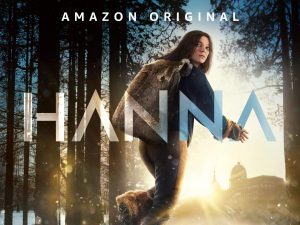 Belle: Oh I have lots of extracurriculars. I like to craft, play board and video games, bake, watch the tellybox and when the world isn’t in the middle of a pandemic, I run specific conventions and travel.
Belle: Oh I have lots of extracurriculars. I like to craft, play board and video games, bake, watch the tellybox and when the world isn’t in the middle of a pandemic, I run specific conventions and travel.
Peter: I love playing video games (RPG’s, JRPGs, and third person action games, and strategy/tactics games) and also playing D&D (I love to play either as a Barbarian or a Bard) and always happy to bring out a board game. I’m a bit of an amateur photographer as well, aside from that well it’s all about reading…
Scarlett: I enjoy running, hiking, camping and traveling. Those activities can always be combined with books, which is the best. While I am constantly renovating/improving something around my house, I also like to practice photography and hit used bookstores or antique shops on the weekends.
Theo: I’m doing a lot of climate fiction related reading for a PhD at the moment and I tend to rage-tweet about the state of the world more than is probably healthy or sensible. [Ed. No, tweeting is not a hobby but we’ll let this one slide] I get sucked into binge watching TV shows (Hanna is a particular favourite at the moment – kick-ass female protagonist? What’s not to like). I also like buying plastic airplane kits and sometimes even making them – with my youngest daughter.
9. Christopher Lee famously reread Lord of the Rings once every year. Which fantasy book have you (would you) re-read the most times? Why?
Calvin: Ironically, Lord of the Rings is one I reread often. Until recently, I was also rereading The Obsidian Trilogy by Mercedes Lackey and James Mallory once a year. It has that wonderful mix of magic and memorable characters that I’m drawn to, plus epic battles! I also routinely reread Brandon Sanderson novels, particularly the Stormlight Archive. Again, we’re talking epic battles, memorable characters, and magic–and in this one there’s that element of growth in the magic system that I love. While I haven’t reread it as often as these others, the Cradle series by Will Wight is one I’ve reread and expect to enjoy again in the future. It should be no surprise that it has wonderful magic, epic battles, and (you guessed it!) memorable characters!
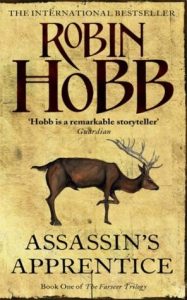 Belle: Robin Hobb would have to be my most read author, by quite a margin. I don’t even know how many times I’ve read the Farseer and Liveship trilogies, but I sure did always start with Assassin’s Apprentice and work by way through each time a new book came out. Apart from being an amazing collection of books, Assassin’s Apprentice (and the rest of the trilogy) was the first book I purchased with my own money, way back when I was a tiny Belle. That series was probably my first real experience in adult fantasy, and will always hold a special place in my heart.
Belle: Robin Hobb would have to be my most read author, by quite a margin. I don’t even know how many times I’ve read the Farseer and Liveship trilogies, but I sure did always start with Assassin’s Apprentice and work by way through each time a new book came out. Apart from being an amazing collection of books, Assassin’s Apprentice (and the rest of the trilogy) was the first book I purchased with my own money, way back when I was a tiny Belle. That series was probably my first real experience in adult fantasy, and will always hold a special place in my heart.
Peter: For me this is The Stormlight Archive series by Bradon Sanderson, amazing characters, an evolving magic system and epic battles on the land and the sky – it has been a routine for me since about 2011. Also something I am starting to return to is The Wildfire Cycle by D.P. Wooliscroft, an epic story of rebellion, a kingdom in peril and some truly amazing characters.
Scarlett: That is a tough question for me as I have rarely reread anything other than classics before, though I can see myself trying it out. They say, one should read a good book three times in a lifetime to see how one’s own perspective changes. Perhaps I should make it a thing and start a traditional reread. Hit me with your suggestions!
Theo: I’m not a great re-reader of any books. However, the one I have gone back to more than once is Mercedes M Yardley’s Pretty Little Dead Girls. Despite it’s rather unsettling title, it’s a delightfully joyfully whimsical read that Goodreads tells me I have now read about four times. From fantasy the only series I have started re-reading is N.K.Jemsin’s The Fifth Season. The whole trilogy was so beautifully constructed that I want to go back and re-read every scene through the lens of “Now that I know…”
10. And finally, what mythical creature would you ride into battle?
Calvin: Do we pick a general category here, or a specific creature? Because if the latter, I want to ride Orthos, from Cradle! After all, the dragon advances. But if a general category, then obviously I’m picking a dragon.
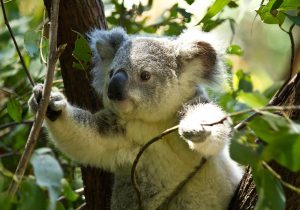
We do not recommend you Google ‘Drop Bear’. Not unless you want koalas ruined for you.
Belle: I hear what everyone else is saying. But. Drop bear. Maybe a griffin. But probably a drop bear.
Peter: A Dragon, fire breathing, flying and armoured scales. You could not ask for much more when heading in to battle (maybe a magic shield but I am over complicating this)
Scarlett: I think we are in unison on this one, so far. Dragon is the correct answer!
Theo: Like Belle I will also stray from the Dragon path – or possibly just cheat and say a Chimera. It’s a mythical beast combining three creatures and still breathing fire! (So I guess it’s sort of a Dragon). But since chimeras exist in real life, in that people can have DNA from other people – like with bone marrow transplants – I think it is time they featured more in fantasy novels.

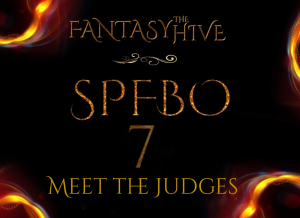
[…] out our introduction here | meet this year’s judges here | read all about the contest’s origins here | and keep track of phase […]
[…] super excited here at the Hive; we’ve already lined up our judges and interviewed them, and now we can reveal to you our process for this […]